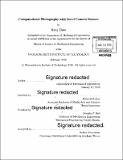Computational photography with novel camera sensors
Author(s)
Zhao, Hang, Ph.D. Massachusetts Institute of Technology
DownloadFull printable version (8.152Mb)
Other Contributors
Massachusetts Institute of Technology. Department of Mechanical Engineering.
Advisor
Ramesh Raskar.
Terms of use
Metadata
Show full item recordAbstract
In this thesis, two computational camera designs are presented. They target two major goals in computational photography. high dynamic range (HDR) imaging and image superresolution (SR). HDR imaging refers to capturing both bright and dark details in the scenes simultaneously. A modulo camera does not get saturated during exposure, enabling HDR photography in a single shot without losing spatial resolutions. The second camera achieves image super-resolution with its non-conventional pixel design. It is shown that recording multiple images with a sensor of asymmetric sub-pixel layout increases the spatial sampling capability compared to a conventional sensor. Both proposed camera designs are the combination of novel imaging sensors and image recovering algorithms. Their potential applications include photography, robotics, and scientific research. Theoretical analyses and experiments are performed to validate our solutions.
Description
Thesis: S.M., Massachusetts Institute of Technology, Department of Mechanical Engineering, 2016. Cataloged from PDF version of thesis. Includes bibliographical references (pages 57-62).
Date issued
2016Department
Massachusetts Institute of Technology. Department of Mechanical EngineeringPublisher
Massachusetts Institute of Technology
Keywords
Mechanical Engineering.